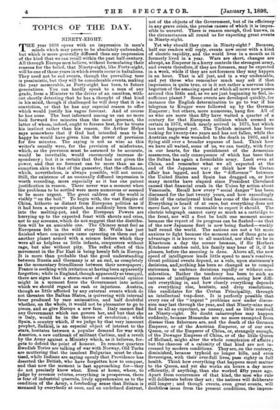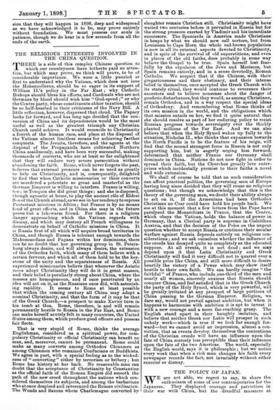TOPICS OF THE DAY.
NINETY-EIGHT.
THEyear 1898 opens with an impression in men's minds which may prove to be absolutely unfounded, but which is more generally diffused than any impression of the kind that we can recall within the past half-century. All through Europe men believe, without formulating their reasons for the belief, that Ninety-eight, like Forty-eight, will be one of those years in which events occur in battalions. They need not be sad events, though the prevailing tone is pessimistic, but they will be considerable events, making the year memorable, as Forty-eight has been, to future generations. You can hardly speak to a man of any grade, from a Minister to the driver of an omnibus, with- out shortly detecting that he has a thought of that kind in his mind, though if challenged he will deny that it is a conviction, or that he has any especial reason to offer which would justify his vague forecast. And of course he has none. The best informed among us can no more look forward five minutes than the most ignorant, the latter of whom, indeed, ought to foresee best, for he trusts his instinct rather than his reason. Sir Arthur Helps says somewhere that if God had intended man to be happy he would have given him the power of prevision for five minutes. The saying is not as wise as this writer's usually were, for the prevision of misfortune, which, as the prevision must be assumed to be accurate, would be inevitable, would enormously increase de- spondency; but it is certain that God has not given the power, and that no forecast can be more than an as- sumption akin to that of the gamester, that the offchance, which, nevertheless, is always possible, will not occur. Still, the existence of an unusually diffused impression is worth recording, more especially as it has one patent justification in reason. There never was a, moment when the problems to be settled were more numerous or seemed to be more urgent. The great caldron of the world is visibly "on the boil." To begin with, the vast Empire of China, hitherto as distant from European politics as if it had been a separate planet, has suddenly been thrown into the melting-pot, and the European Powers are hurrying up to the expected feast with shouts and cries, not to say screams, which do not suggest that the distribu- tion will be an amicable one. The Chinese must feel as Europeans felt in the wild story Mr. Wells has just finished when conquerors came careering on them out of another planet armed with a science before which they were all as helpless as little infants, conquerors without rage, but also without pity. The reflex effect of this movement in the Far East is being keenly felt in Europe. It is more than probable that the good understanding between Russia and Germany is at an end, as completely as the momentary friendliness between their newspapers ; France is seething with irritation at having been apparently forgotten; while in England, though apparently so tranquil, there are signs that a storm-wave of commercial opinion might in a moment force the Government into action which we should regard as rash or injurious. Austria, though so little affected by any external events which do not threaten the Balkan States, is quivering with internal fever produced by race animosities, and half doubtful whether, on the whole, it would not be pleasanter to go to pieces, and so give Europe a new face. Italy cannot find any Government which can govern her, and but that she is Italy, would be in the throes of revolution ; while Spain, a country which, if we judge by that very innocent prophet, Zadkiel, is an especial object of interest to the stars, hesitates between a popular demand for war with America, a new outbreak of militant Carlism, and a revolt by the Army against a Ministry which, as it believes, for- gets to defend the point of honour. In remoter quarters Swedish Tories are talking of war with Norway, Old Turks are muttering that the insolent Bulgarian must be chas- tised, while Indians are saying openly that Providence has deserted the British, who have forgotten how to conquer, and that now the moment is fast approaching for—they do not precisely know what. Even at home, where, to judge by revenue returns, everything is prosperous, there is fear of industrial quarrels, lively apprehension as to the condition of the Army, a foreboding sense that Britain is menaced by everybody at once, and an undefined distrust, '( not of the objects of the Government, but of its efficiency in any grave crisis, the precise causes of which it is impos- sible to unravel. There is reason enough, God knows, in the circumstances all round us for expecting great events in Ninety-eight Yet why should they come in Ninety-eight ? Because, half our readers will reply, events now occur with a kind of electric rapidity, and the world lives in a month as it formerly lived in a. year. Wars are short, changes are abrupt, an Emperor in a hurry controls the strongest army, and events therefore, if they are foreseen, may be expected in a week, while if they are not foreseen they may happen in an hour. That is all just, and in a way undeniable, and yet those who remember much may ask if that impression is quite true, or is it not rather a, nervous idea begotten of the amazing speed at which all news now passes around this little and, as we are just beginning to feel, in- sufficient planet ? Some events are developed quickly, for instance the English determination to go to war if his telegram to Kruger were followed up by the German Emperor ; but others, more numerous, hang fire. All of us who are more than fifty have waited a quarter of a century for that European collision which seemed so certain in 1872, which nearly arrived in 1875, but which has not happened yet. The Turkish minaret has been rocking for twenty-two years and has not fallen, while the Austrian eagle was wounded to the death in 1866, and is flying still over a broader expanse of land. Think how we have all waited, some of us, we can testify, with fury in our hearts, for the punishment of the Armenian massacres, the only consequence of which has been that the Sultan has again a formidable army. Look even at China, and remember what we all expected at the end of the Japanese war ; or think how the Cretan affair has ]agged, and how the " difference " between the United States and Spain has dragged on, or how many months have elapsed since President Cleveland caused that financial crash in the Union by action about Venezuela. Recall how every "social danger" has been discussed for the last twenty years, and how exceedingly little of the cataclysmal kind has come of the discussion. Everything is heard of at once, but everything does not move fast, nor is it reasonable to expect it should. The- electric telegraph cannot carry so much as a cartridge to the front, nor will a fleet be built one moment sooner because the report of its progress can be flashed—as that of the new Japanese fleet is now being flashed—weekly half round the world. The nations are not a bit more anxious to fight because the moment one of them gets an advantage it is known to all mankind, nor shall we be in Khartoum a day the sooner because, if Sir Herbert Kitchener catches cold, his family may hear of it, if he pleases, before the sneezing is done. Above all, the new speed of intelligence lends little speed to men's resolves. Great political events depend, as a rule, upon statesmen's- decisions, and:nothing has been so changed as to compel statesmen to embrace decisions rapidly or without con- sideration. Rather the tendency has been to such an increase of intelligence that statesmen, seeing how diffi- cult everything is, and how closely everything depends on everything else, hesitate, and drop resolutions,. like candidates for the Cretan Principality, through an intellectual trap-door. It is perfectly possible that. every one of the " urgent " problems now under discus- sion may last through the year, and that Ninety-nine may find us all as expectant, as uneasy, and as little resolved. as Ninety-eight. No doubt catastrophes may happen suddenly, because Monarchs are no more exempted from disease than fishermen are, and the death of the German_ Emperor, or of the Austrian Emperor, or of our own Queen, or of the Emperor of China, or, strangely enough, of the Dowager Empress of China, or of the little Queen of Holland, might alter the whole complexion of affairs ; but the chances of a, calamity of that kind are not in- creased by modern conditions. They are, on the contrary, diminished, because typhoid no longer kills, and even Sovereigns, with their over-full lives, pass eighty in full health. Think how everything that happens must matter to the Queen, and yet she works six hours a day more efficiently, if anything, than she worked fifty years ago. Apart from occurrences of that kind, the men who rule' will deliberate before they act ; the nations will deliberate- still longer ; and though events, even great events, will doubtless issue from the present conditions, the impres- sion that they will happen in 1898, deep and widespread as we have acknowledged it to be, may prove entirely without foundation. We must possess our souls in patience, though we do hear in a few seconds from all the ends of the earth.











































 Previous page
Previous page